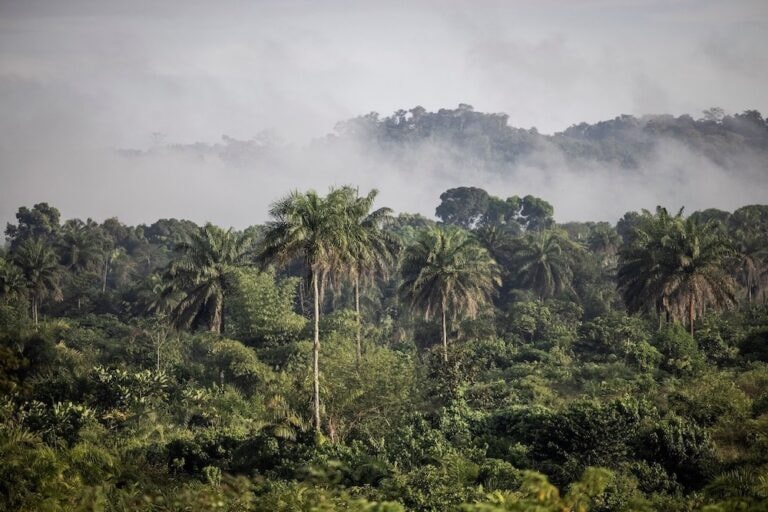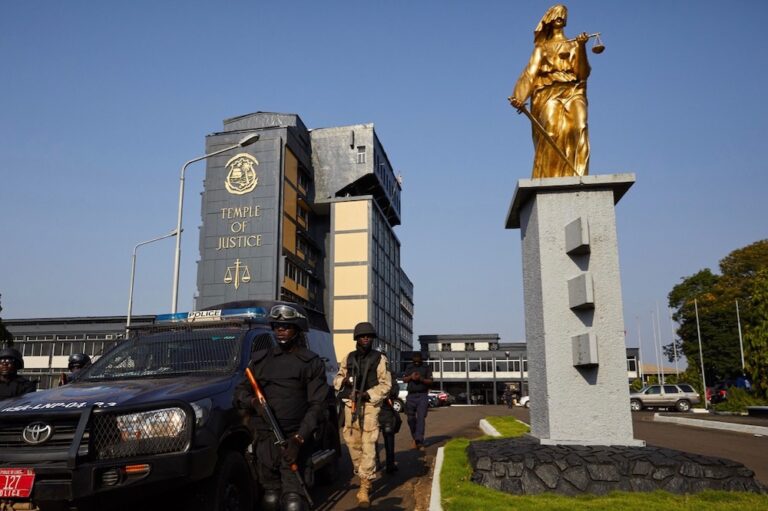The state of the Liberian media in 2009 is a far cry from the freedom of expression heralded by President Sirleaf at her inauguration in 2006, says CEMESP.
(CEMESP/IFEX) – The Center for Media Studies & Peace Building (CEMESP) has launched the 3rd edition of its account of threats to freedom of expression with calls for the government and authorities to recognize and support the inalienable rights of others to dissent.
In a statement read at the launch in Monrovia on March 1 2010, CEMESP Executive Director Malcolm Joseph recalled that “the utility of intimidation as a means of enforcing conformance,” is a treachery that has no space in our democracy and must be condemned. Speaking further, Joseph noted that “intimidation has taken many forms to renew censorship in Liberia,” describing it as a “sad day.”
According to Joseph, CEMESP recognizes the right of government and its functionaries to disagree with media reports, but regretted the absence of the “requisite environment to foster the easy and free exchange of information from and about the government”. He said in the absence of this, misinformation will easily thrive.
With reference to ethical transgression by media houses, CEMESP said while it does not condone mischief in news reporting, the absence of a regime to compel public officials to respond to public queries obviously provides room for misinformation. The statement said efforts to ensure the reforms that will, among other things, compel pubic officials to respond to press inquiries, has been stalled over the last two years.
CEMESP notes that just as the legislature passes government economic stimulus measures, laws should also be passed to benefit the media, enhancing transparency and making the process of legislative oversight easier.
According to Joseph, “Liberians would recall the sad misapplication of the law through such awkward concepts like criminal malevolence, criminal libel and sedition, which have all been declared unconstitutional in jurisdictions that gave birth to ours.”
On the issue of increasing lawsuits against media houses on account of their perceived false reporting, CEMESP said this is healthy for the democracy-building process, considering that it supports the search for justice. The groups however expressed concern that judgments must not be made to the effect of running the media out of business. By that, the judiciary would be supporting attacks on freedom of expression, which ultimately undermines whatever rule of law regimen anticipated in Liberia. CEMESP then drew attention to the recent demotion exercise at the Liberia Broadcasting System on account of a disagreement with management, noting the similarity between the action and a 2006 memo against the broadcast of corruption-related stories.
In introducing the report, the Chairman of CEMESP, Abdullai Kamara, observed that “In this era of recovery in Liberia, one would wish that everything being recovered was in the affirmative and development sense,” noting that recovery cannot be in terms of bad governance, corruption and media censorship.
In listing the various violations, CEMESP noted that “aside from the thrashing and brutalization without amends, the threats and actual closure of unfavorable media, whether by the edicts of (former) Information Minister Laurence Bropleh or the detention and prosecution of print house managers on account of articles produced by independent newspapers, are clear indicators of the end of an era of uncensored media, as Liberians and media practitioners have gotten accustomed to since 2003.”
“This is the state of the Liberian media as CEMESP encountered across 2009, which is a far cry from the freedom of expression heralded by President Sirleaf at her inauguration in 2006,” Joseph read. “That accounts of threats to freedom of expression in 2009 are absolutely within the domain of the government highlights further the level of intolerance, which must be reconsidered,” the statement said.
“The challenge is for the government to endeavor to allow people to listen to and understand the truth, which must set the Liberian people free. By doing this, the government must change the statistics by the time the next publication comes forth at the end of 2010.”
The center noted that reporting these accounts is not an especially favorable occupation, but indicated that it is challenged in reporting because of the obligation to draw attention to the continued threats to the universally acknowledged right of freedom of expression.
CEMESP then called upon the government, the media and the public at large to see the report as an effort to identify the issues and to rally everyone to accept the fact that people have the inalienable right to express themselves, criticize the government, think to the extent of their wisdom, and perchance enjoy the fullest vestiges of their humanity.


